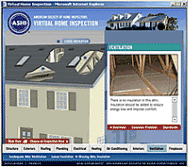|
203(k) - How It Is Different
The
loan is a combination financing of the home mortgage and the home
improvement rolled into one loan to achieve a single loan and at a lower
interest rate.
Most mortgage financing plans provide only permanent financing. That is,
the lender will not close the loan and release the mortgage proceeds
unless the condition and value of the property provide adequate loan
security. When rehabilitation is involved, a lender requires the
improvements to be finished before a long-term mortgage is made. If the
borrower has proven and is deemed competent to do repairs, the borrower
may do so. The reimbursement is only for materials. There is no payment
for work or sweat equity
When there is major renovation the existing foundation system must
remain in place. The loan can be eligible for buildings that end up 1-4
unit dwelling where the borrower is an occupant. Condominium units are
eligible where the repairs are limited to the interior of the unit.
Two
Types of 203(k)
Streamline 203-K
The repairs can range be up to
$35,000. However a full 203(K) must be used if there are structural
changes to the house. In essence the borrower becomes the consultant and
the bids become the work write-up. Each 203(K) lender may have special
additional requirements. The work must be done in 6 months and there are
only two draws per specialized contractor. There can be a draw advance
to purchase materials. If the repairs are over $15,000 there must be an
inspection by a FHA inspector/consultant to sign off on the work.
203(K)
The minimum amount of the loan is $5,000; the project shall not
exceed 6 months; and there can be up to 5 draws. A 203(k) consultant
works with the contractor to review the scope of the work and to divide
the project into the 203(K) accounting categories. There has to be a
building permit with the municipality for the work being done.
203(k)
Process
Eligible Improvements
The homeowner can use the
203(k) program to finance home improvements or modernization. All
health, safety and energy conservation items must be addressed prior to
completing general home improvements. Luxury items and improvements are
not eligible as a cost rehabilitation.
Appraisal Reports
The appraiser must provide an opinion of the After-Improved value of
the subject property and an As-is value.
203(k) Home Inspection
A home inspection is done to determine if the home meets the minimum FHA
housing standards. These include
a)
the adequacy of the existing structural,
heating, plumbing, electrical and roofing systems, b) there are no
defects that will affect the health and safety of the occupants,
c)
upgrading attic insulation to current
minimum building standards,
d)
there are no rodents, dryrot, termites and
other infestation
203(k) Consultant
The 203(k) consultant is paid for a home inspection (feasibility
inspection), to prepare renovation cost breakdown into the 203(K) 35
accounting categories and the draw inspections.
Rehabilitation
Escrow Account
When the loan is closed, the proceeds designated for the
rehabilitation or improvement (including the contingency reserve) are to
be placed in an interest bearing FDIC escrow account.
Contingency Reserve
There will be a contingency reserve
created so funds will be available for unforeseen health, safety, and
necessity deficiencies. This reverse will range for 10% to 20%. If the
scope of work is well defined and uncomplicated, and the rehabilitation
cost is less then $7500, the lender may waive the requirement for a
contingency reserve.
Draw Inspections
As the work is completed, the 203(k)
consultant goes out to the property to determine if the work has been
completed and in a workmanlike manner. With the exception of carpet and
cabinets, materials cannot be paid until they are installed.
Holdback
A ten (10) percent holdback is required on each release from the
Rehabilitation Escrow Account. The total of all holdbacks may be
released only after a final 203(K) consultant inspection, copy of
municipal building inspection, and release of lenderís release of lien
document.
Trace
Inspections 203 (k) ConsultingFees
Home Inspection (Feasibility
Inspection)
A minimum FHA minimum standard
inspection fee starts at $225 and is payable at the time of the
inspection
203(k) Consultant Fee
The fee is based upon the cost of the improvement. The table below
shows the fee structure. This payment is due at closing or 60 days,
whichever is sooner. |




